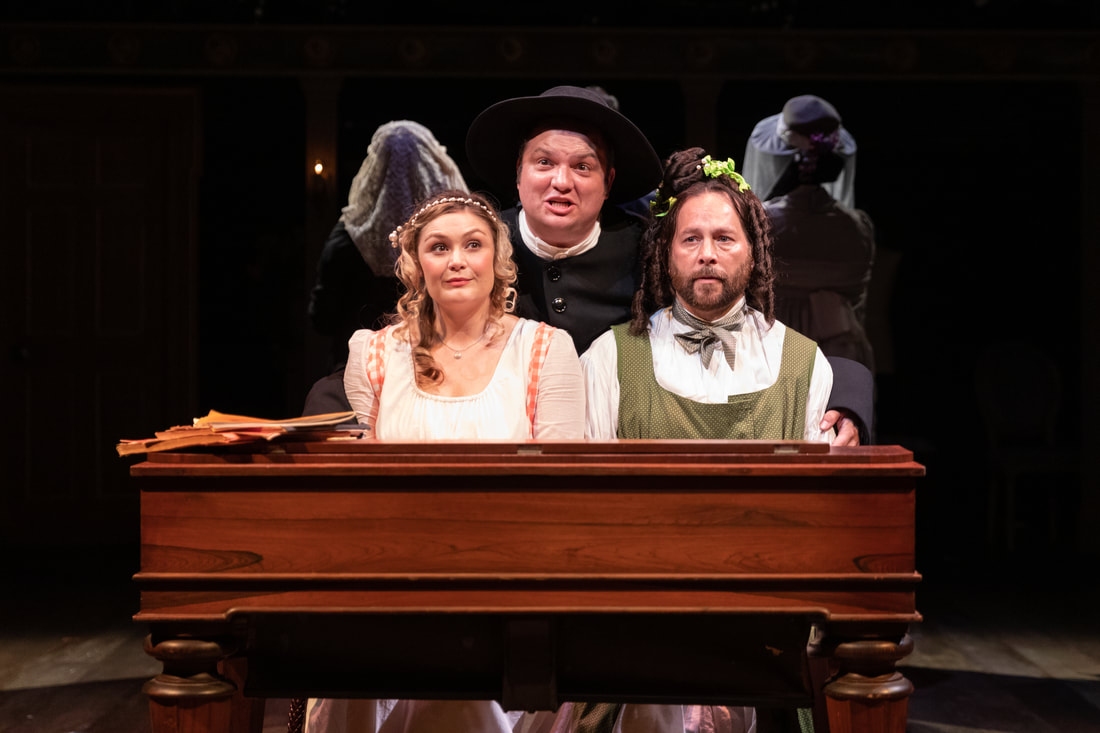|
Jacque Wilke (left) stars in "Pride and Prejudice" at Cygnet Theatre. Karli Cadel Photography Sorry, Jane Austen lovers, but “Pride and Prejudice” is just such a bore.
But thanks, playwright Kate Hamill, for putting some much-needed pizazz in the too-oft-told story of Elizabeth Bennet and Mr. Darcy. Just as she did previously with Austen’s “Sense and Sensibility” and with William Thackeray’s “Vanity Fair,” Hamill created a contemporary adaptation for “Pride and Prejudice” that even the cynical at heart can appreciate. Cygnet Theatre’s staging of Hamill’s Pride and Prejudice is long, but also long on spirit and ingenuity. From a purely subversive standpoint, it could be thought of as “The Pointer Sisters at Pemberley.” The R&B trio’s “Jump (for My Love)” is this production’s de facto theme song, symbolic not only of Lizzy’s empowerment but also of the Hamill adaptation’s abandoning of convention. The original novel has not been abandoned, however. This Pride and Prejudice is very much true to what Austen wrote in 1813. The premise, simply put, is that Mrs. Bennet (Shana Wride) is bound and determined to marry off her eligible daughters, Elizabeth (played with pluck and conviction by Jacque Wilke) among them. The narrative takes many a twist and turn from there, with Elizabeth’s maturation leading her to understand herself and love. But this Pride and Prejudice, played out on an industrial-looking, quick-change set designed by Sean Fanning, choreographed by Michael Mizerany, and directed by Rob Lutfy, goes where no telling of the tale has gone before. Actors Kevin Hafso-Koppman, Jake Millgard and Adrian Alita (beard and all) perform at times in drag. Notably, Hafso-Koppman portrays both Mr. Bingley and the consumptive-sounding Bennet daughter Mary. Pop tunes including Madonna’s “Material Girl” and Cyndi Lauper’s “Time After Time” supplant Regency-period harpsichord music. Comic lines and unpredictable exits and entrances prevail. Most of this activity is apt to generate grins and chuckles more than gales of laughter. The nature of most spoofs, whether in film, on television or on the stage, is that the results are hit and miss. Devotees of the novel shouldn’t be offended; the play is in its way a tribute, imitation being the highest form of flattery and all that. (Review originally published in San Diego CityBeat on 5/29/19)
0 Comments
Leave a Reply. |
AuthorDavid L. Coddon is a Southern California theater critic. Archives
July 2024
Categories |
David Coddon |
|
